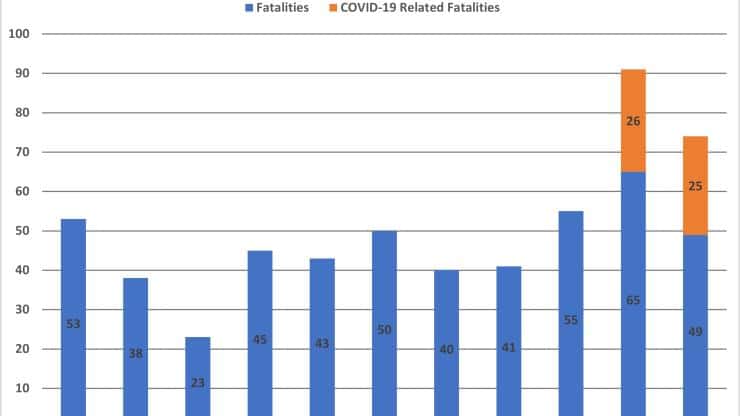
Last Updated on January 31, 2022 1:24 pm
RALEIGH—Struck-by incidents caused the largest number of non COVID-19 work-related deaths last year in the Tar Heel state, based on preliminary information released today by the N.C. Department of Labor (NCDOL). The department’s Occupational Safety and Health (OSH) Division inspected 49 non COVID-19 work-related fatalities in 2021. The division also inspected 25 cases reported as deaths related to COVID-19.
“Workplace fatalities keep me up at night,” Labor Commissioner Josh Dobson said. “Every time there is a workplace fatality, I am notified of it and no matter what the cause, it weighs heavy on my mind. Although I am encouraged by the overall reduction in workplace fatalities, we still have work to do. As we continue to navigate this pandemic, our department will continue to put safety and health first, provide education, training and compliance resources on high hazard industries and work to continue to reduce the risk of COVID-19 in the workplace.”
The OSH Division tracks work-related deaths that fall within its jurisdictional authority so it can pinpoint where fatalities are occurring and place special emphasis on counties or regions where deaths on the job are happening. By tracking fatalities in real time, the department can also notify industries of any concerning patterns or trends identified and issue hazard alerts.
“The overall reduction in occupational fatalities from 2020 to 2021, during a time that the overall workforce increased in our state, is very encouraging,” Kevin Beauregard, director of the state OSH Division, said. “In particular, North Carolina experienced significant reductions in fatalities among employees in the construction and manufacturing industries, while employment in those industries increased. Unfortunately, COVID-19 work-related fatalities accounted for 33.8% of all work-related fatalities in North Carolina last year.”
NCDOL began enforcement of OSHA’s COVID-19 Healthcare Emergency Temporary Standard (ETS) in July 2021. The aim of the ETS is to protect workers who provide healthcare or healthcare support services from COVID-19 in the workplace. The Healthcare standard will remain in effect in North Carolina until the OSH Division determines the standard is no longer necessary to protect healthcare workers from COVID-19 hazards.
“Over 68% of the COVID-19 work-related fatalities investigated were associated with employees within the service industry, and the majority were employed in healthcare,” Beauregard said. “These standards were adopted with the specific purpose of reducing COVID-19 work-related illnesses and fatalities among healthcare workers. The primary goals of NCDOL’s OSH Division include reducing the rates of occupational injuries, illnesses and fatalities.”
The OSH Division partners with businesses and organizations that represent some of the most hazardous industries through partnerships and alliances to heighten industry awareness and assist with education and training.
The services industry suffered the most work-related fatalities with 24 in 2021, two more than in 2020. Most of the services industry deaths were due to COVID-19. The construction industry had the second highest number of work-related deaths with 15, a decrease of 12 from the previous year. Manufacturing had the third highest number of work-related deaths with 10, five less than in 2020.
In addition, government had eight fatalities in 2021, a decrease from nine in 2020. There were six fatalities in the transportation and public utility industry, an increase from five in 2020. Agriculture, forestry and fishing experienced five fatalities in 2021, a decrease from 13 in 2020. There were also three work-related fatalities in wholesale trade, an increase from two in 2020. Retail trade experienced three workplace fatalities.
There were no work-related fatalities in 65 of North Carolina’s 100 counties. Guilford county led with 11 workplace fatalities, followed by Mecklenburg with 10. Wake, Buncombe, Wilson, Henderson, Cumberland, Watauga and Forsyth experienced three fatalities each. Edgecombe, Catawba, Wayne, Cherokee, Union, Lincoln and Cabarrus experienced two fatalities each. Seventeen counties experienced one fatality.
Whites accounted for 24 of the 49 non COVID-19 work-related fatalities. Hispanics accounted for 16, Blacks for seven, Asians for one and Other for one. Men accounted for 46 deaths and women accounted for three non COVID-19 workplace deaths.
The state figures exclude certain fatalities that fall outside its jurisdictional authority. These include traffic accidents, which account for nearly half of all work-related deaths, as well as some homicides and suicides that are investigated by law enforcement agencies. The count also excludes fatalities investigated by federal OSHA and other exemptions in which the department does not have the authority to investigate, such as on farms with 10 or fewer employees.
Federal figures compiled by the U.S. Bureau of Labor Statistics, with cooperation of NCDOL, include all work-related fatalities. The federal figures for 2020, the latest figures available, can be found on the BLS website.
Data for 2021 will be available in December.
Businesses may call 1-800-NC-LABOR to learn more about free safety training opportunities provided by NCDOL or visit our website.




















